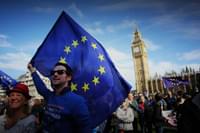
The Remain election interpretation must not go unchallenged
Even before the votes were counted the Continuity Remainers were wrongly interpreting what people had voted for. You cannot simply amalgamate the votes in ways that suit you, says Sean Walsh.
The Brexit Party has won more votes and seats than any other party in the European Election. Inevitably, the Remain establishment has concluded that Leave has therefore lost. Why? Because of a prioritising of raw arithmetic over the legal mechanics of the election itself: if you add up, they argue, the votes for the "Remain parties" it comes to more than those of the Brexit Party. QED.
The same people who told us that we didn't know what we voted for in 2016 have appropriated the voting intentions of millions of people according to their preferred (and forced) mechanism of interpretation.
It was predictable to the point of obviousness that this was going to be the attack line. The plan was, once again, to confiscate the result. It needs to be nipped in the bud before -like "hard Brexit", "crash out" and "cliff edge" -it acquires by repetition an undeserved status of orthodoxy.
On Thursday morning, with Theresa May's position still unclear and her odious Remain Treaty still technically alive, how would the Brexiteer/democrat who wished to vote for some form of genuine withdrawal deal have voted? Which party at that point was standing up for that position? None.
And consider the following point: prior to the vote Mr Farage was criticised by all his opponents for making his party a single issue one. "Where's the manifesto?", they said, not entertaining even the possibility that it was possible to get through a campaign without codifying an intended future betrayal of the campaign pledges. "What are your policies beyond Brexit?" they demanded, thereby conceding that their own parties were standing on issues that were unconnected to the mere principle of democracy. Because Farage made clear that his party was not about mere policies but about the covenant of trust that logically precedes the development and announcement of those policies.
For these reasons – and others- Continuity Remain is not entitled to simply amalgamate the votes of sympathetic parties and announce a dubious composite that is mathematically greater than the votes of the party that clearly won this thing. That is the electoral equivalent of garbage in, garbage out. A grubby and unworthy form of political number crunching that overlooks the fact that the results of the calculation will always be determined by what you want the numbers to mean.
The strategy is, if you like, a new version of the Remain failure to see that there are things in play that go beyond mere calculus. Just as the case for leaving the EU is in no way smoothly reducible to the economic consequences of departure, so the results from Sunday evening have a qualitative aspect to them. Farage's insight is that the deep fractures in the social order transcend the issue of whether to leave the EU: the primary issue has become that of trust. The numbers approach cannot capture that new reality. But 32% of those who voted discerned it, nevertheless.
And he did, in any case, have the numbers.
It goes without saying that the BBC -having now completed its evolution from faux analyst of the political landscape into unleaded activist for the Remain cause- went along with the fake and inappropriate maths. It spent most of the night shilling for those who are effectively filibustering the result of the 2016 referendum. There is a dark alchemy in play in all this: a plebiscite that we were told would be binding has now been transformed into an inconvenient backdrop for continuing discussion of whether we should leave or remain at all. The democratically distant but intrusively ever-present technocracy that is mistakenly referred to as "Europe" looms as large in our lives as it did on June 23rd, 2016.
But if the referendum itself was an event that took place three years ago, the result is alive in the present. It exists as metaphysical fact and cannot be willed away as inconvenient. If Alistair Campbell and his ilk manage to assassinate it and introduce another plebiscite event it will, like Banquo's ghost, continue to assert itself- and rightly so. A "People's Vote"? Done that. A "confirmatory referendum"? What's it supposed to confirm now that May's wretched stitch up is finally pushing up the daisies? Some of the main protagonists for Continuity Remain continue to assert that a further plebiscite must be a choice between May's "deal" and Remain. Have they been asleep for the last week?
So, what happens now? It would be foolish to predict and even though I am a fool I won't be tempted. The Tory Party has been plunged into deep crisis and therefore into great opportunity. They have room to pivot. The intransigence that heads up the party has finally been dissolved. Labour are not so lucky in that regard. There are reasons to believe that prudential self-interest and rationality might coincide in this leadership contest, and that a candidate can come through who recognises that accepting the possibility of leaving on WTO terms is not the same as willing that outcome (that fallacy is one of Hammond's. Space precludes that I list his others). That it might instead be the case that conceding a willingness to simply leave the EU without an arrangement is the best way of ensuring that possibility does not happen.
But a new leader cannot come from within the Cabinet. They are too implicated in May's attempt to keep us in. They are, if you like, the ones responsible for disenfranchising the voter we met in the earlier paragraph of this piece.
Natural justice demands that they are not rewarded for this.







